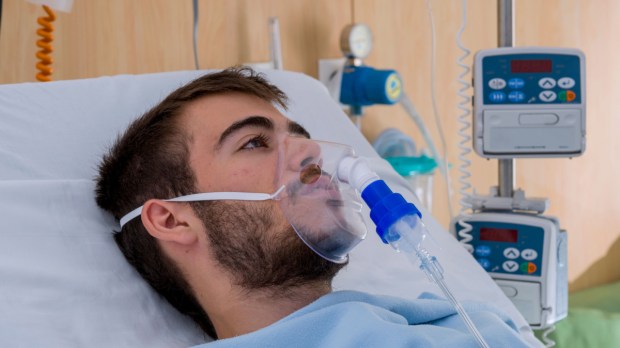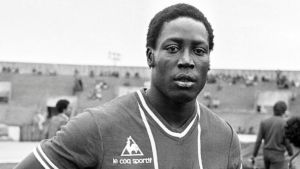I learned of this magnificent story, as did many others, from the Italian daily newspaper Avvenire. Reporter Lucia Bellaspiga tells the story of a mother’s heroic dedication to help her son recover, despite the initial skepticism of the well-intentioned doctors.
The story starts on July 3, 2016. It was late, and 21-year-old Christian Scaiola was riding his scooter with a friend on board. A car in front of them suddenly stopped: Christian slammed his head forward against the vehicle, and then bounced backward, against his friend’s helmet – the friend didn’t suffer a single scratch. Christian suffered a double blow to the head, which inflicted violent trauma.
Avvenire reports that his mother, concerned at his delay in arriving home, kept trying to reach him on his cell phone. “If you keep not answering, I’ll be really ticked off!” she wrote, not knowing that the sirens she heard in the distance were for him.
And that’s where the journey began – a terrible, dark journey with minimal hope. He ended up in an unconscious state, which used to be called “vegetative” — a label that often doesn’t take into account the signs of minimal consciousness that may be present or may appear even after a long time.
The doctors who rescued him did whatever was necessary, scrupulously: they opened part of his skull to relieve pressure on his brain.
At the hospital of San Gerardo in Monza, he seemed to slowly but surely slide toward an irreversible state that would have meant it was only possible to keep him alive but unconscious, maintaining a certain acceptable well-being with no prospect of improvement.
Christian was tracheotomized and placed on a ventilator.
The first phase of rehabilitation
The neurologists, who see so many cases like this, perhaps convinced by the statistics (they knew how it usually turns out), didn’t believe what his mom said she saw and heard: “My son moves a finger when I squeeze his hand,” Viviana told them. Of course, moms have been known not to give up so easily and to see progress and talents everywhere, even when no one else can see anything there.
They, perhaps, might have given up, but she had not.
“In Garbagnate there were excellent doctors and physiatrists, wonderful people,” she told Avvenire, “But after six months they told us there was nothing more to be done and my son was transferred to Palazzolo Don Gnocchi, to the ward for people in a vegetative state. It meant giving up any hope of improvement.”
He would stay for 20 months at the facility outside Milan.
Each of Christian’s days began to look more and more like a copy of the one before, when seen superficially; Viviana, however, was attentive, very attentive, and she saw signs of improvement.
She wanted to take him home, but her apartment building didn’t have an elevator. People thought she was crazy – crazy out of love, sure, but still out of her mind. Perhaps instead she was the only one who had fully understood her son’s reality, the only one who participated in a secret and almost imperceptible dialogue with him. She was the only one who believed that he could return from that mysterious and distant (though not entirely inaccessible) place.
Christian’s skull was still open under the skin, and he was being nourished by a feeding tube. “I, however, had never given up hope, not least because when they had taken him off the ventilator he had simply continued to breathe on his own, which to me was a good sign,” his mother told Avvenire reporter Bellaspiga.
Then one day she put some soft candy on the bureau next to her son’s bed. An extraordinary thing had happened: she left him alone in the room, and when she returned later, it was gone. She concluded that he had eaten it. “No one believed me, so I secretly began to feed him some things by mouth,” she told Avvenire.
Going home
She was able to move to a different apartment with an elevator, and the doctors covered the hole in her son’s skull. For Viviana, that was enough for her to take him home and start again. Because that’s what she’s been doing, ever since his accident: she’s been starting over, going from new beginning to new beginning, from stage to stage, from one seemingly negligible little milestone to another. We can only imagine the immense fatigue and the strength she must have needed in order not to completely neglect herself in the process.
On Dec. 17, 2018, two and a half years after the accident, they were home together again. “He wasn’t as you see him today,” his mother told Bellaspiga. “He was absent, he hadn’t spoken for years, he only made unconscious noises and movements, and he weighed 100 lbs. But instead of feeding him with the feeding tube, I used to blend his food, and after some time I didn’t even blend it anymore; by then he was eating everything … Today he weighs 176 lbs and only still struggles to swallow with liquids, so he drinks with a straw.”
Here, the Avvenire reporter notes an intervention from the young man himself: “Christian raises his index finger and speaks, slowly (each word takes effort), ‘My favorite dishes are pizza and grilled shrimp, then cutlets and baked pasta.’”
They haven’t been left to their own devices by public services and health care; he receives physiotherapy, and therapy from a psychologist, a speech therapist, and a psychomotility therapist from the region; but this is still not enough.
His mother pays an osteopath herself, although she has quit her job outside the home to do the more demanding one of taking care of her son. It’s worth the trouble, Viviana says, as the specialist has helped him speak again and be able to chew.
She admits that she’s aware that none of this improvement could have been taken for granted; that even her Christian could have had to continue the journey of existence in that strange tunnel from which only a few emerge. Very few, as only two have done so in the ward where her son was hospitalized.
I don’t know if she’d agree with being called heroic, special, or super: this mother was simply was willing to pay the personal and material cost required to stay at her son’s bedside and give him what she could, intelligently, with the help of professionals.
And when Christian resumed speaking, his first word was “Mom,” as when he was little.
If this isn’t rebirth, what is?



